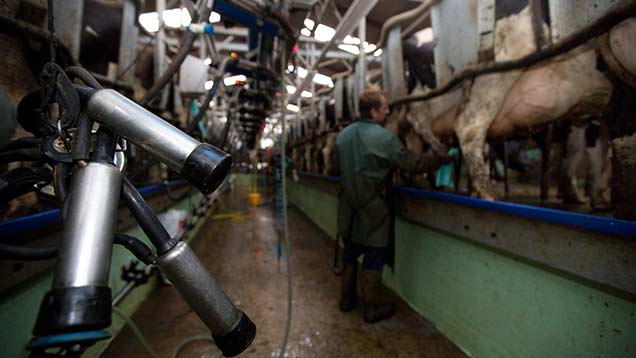Low milk prices ‘a threat to productive capacity’
 © Tim Scrivener
© Tim Scrivener Milk production capacity will fall unless prices improve and TB is probably holding back the rate of exit, an agricultural accountant has warned.
Processors and retailers had to take heed of the dire straits producers were in, said Mike Butler, chairman of Old Mill.
“Quite frankly many dairy farmers have simply had enough and processors and retailers should consider how profitable and efficient their own businesses will be when they can only find milk to fulfil 80% of their processing capacity,” he said.
See also: Costed dairy herds show massive slump in margin
“The industry is on its knees and another 12 months at current levels will simply be too much to bear.
“There is no question that if the current low prices continue it won’t take long to see a significant shift in the industry and ultimately a drop in productive capacity,” said Mr Butler.
“Many farmers are looking at their options very carefully now and I would imagine that exit strategies would be speeded-up if it weren’t for the widespread existence of TB within many herds.”
The firm recently canvassed the opinion of about 100 milk producers and found that they expected an average 2p/litre milk price rise over the next year.
Twenty-four percent expected their average farmgate milk price to increase from its current six-year low of about 24-26p/litre this time next year.
About 36% expected it to remain between 23p/litre and 25p/litre, with 40% predicting an increase to 27-29p/litre.
“In a way it is a sign of optimism that only 2% of farmers expected prices to drop further,” said Mr Butler.
“With no sign of an immediate improvement in prices, dairy farmers are understandably extremely concerned about their future in the industry.
“Most are now steering away from significant investment in their businesses and a notable proportion were very definitely questioning whether there was a future for them in dairying at all, which is very sad.”
Some banks now seemed to appreciate the practical solutions needed in terms of debt refinancing, he said, with short-term finance to cover late basic payments and the possibility of capital repayment holidays for existing debts and restructuring debts over longer periods.
